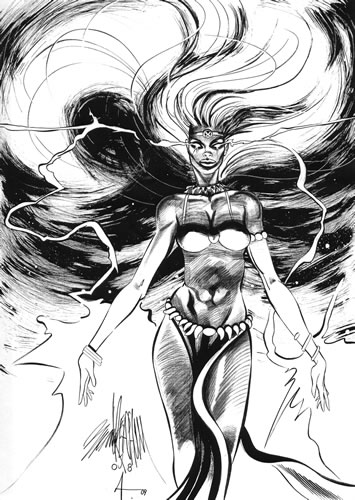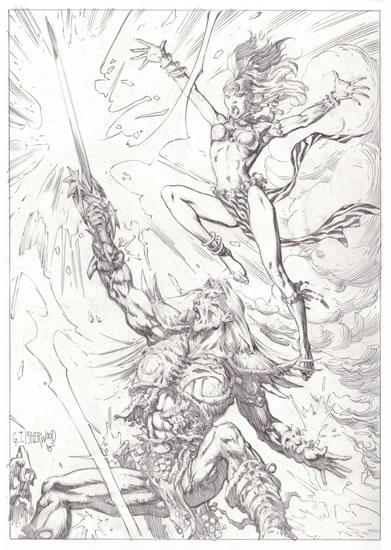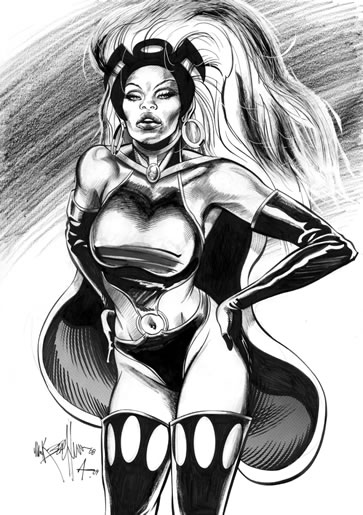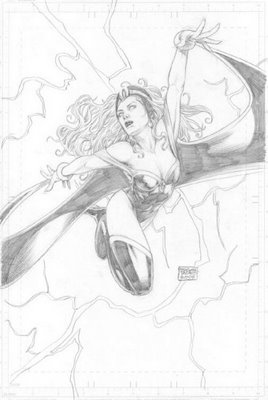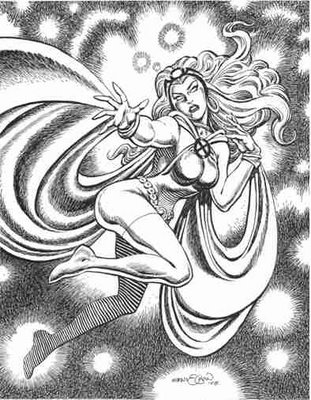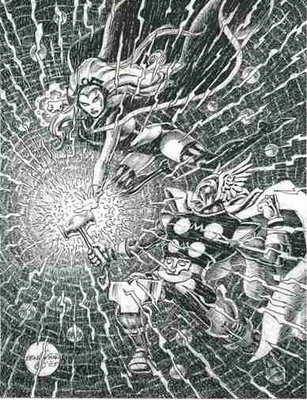The literate souls among you know, of course, that it was Juvenal, the Roman poet, who posed the infamous question above. Although the words can be variously translated from the Latin, the most familiar English rendering is...
"Who watches the watchmen?"In the case of the film of that latter name, the answer, apparently, is...
"I do."This afternoon, I spent nearly three hours alone in a darkened theater (I was literally the only patron) viewing director Zach Snyder's
Watchmen, the cinematic iteration of Alan Moore and Dave Gibbons's
seminal 1985 graphic novel. At least, of Dave Gibbons's work — he's recognized in the film's opening credits as the book's "co-creator and illustrator" — as Moore, in a characteristic fit of auteurist pique, refused to allow his name to be mentioned in connection with Snyder's movie.
Although I avoided reading any in-depth reviews before seeing the film for myself, I'm aware from the chatter on various comic-related forums I frequent that comic fandom is of divided mind about Snyder's work. Some diehard
Watchmen loyalists decried the liberties Snyder took in bringing the graphic novel to the screen. Others enjoyed — or didn't enjoy — the movie on its own merits.
For myself, I wasn't a fan of the original work back when it first appeared, and I haven't reread it in the 24 years since. (I own a copy of the trade paperback that I'm going to get around to eventually. I promise.) Thus, I was able to approach the film with no ax to grind.
And I kind of liked it.
Given that he was working from a byzantine story told in static visuals that had been widely believed unfilmable, I think Snyder delivered about as good a
Watchmen movie as it's possible to make. He managed to be remarkably faithful to the book (to the degree that I remember it), while at the same time incorporating elements that lent themselves to more effective cinematic presentation.
Watchmen has, in that respect, a great deal in common with Peter Jackson's
The Lord of the Rings trilogy, which does an outstanding job at bringing Tolkien's story and characters alive, while also being savvy about where to deviate for the sake of good filmmaking.
I'm not saying, by any stretch of the imagination, that
Watchmen is the equal of
The Lord of the Rings. That would be like comparing an In-N-Out Burger with a sirloin of Kobe beef. One is clearly superior to the other, but they're cut from similar cows.
One of the key evaluative measures for me with any movie is what I call "the watch test." That is to say: Does the film hold my difficult-to-corral attention, or do I find myself glancing at my watch, wondering how soon the agony will end?
Watchmen (no pun intended) passes the watch test — despite its daunting length, I only needed a single peek at the time (during a slow stretch about halfway through). Any film that keeps chronically distracted me engaged for two hours and 42 minutes with only a single momentary hiccup is doing a lot of things well.
Is
Watchmen a perfect movie? Well, no. Some of the same elements that turned me off to Moore and Gibbons's original bugged me here — the intense, often graphic violence; the nihilistic worldview; the illogical (dare I say ridiculous?) behavior of many of the characters. And while I, unlike the hardcore aficionados, found the film's version of the story's dénouement an improvement over the book, it's still painfully silly. I also question several of Snyder's casting choices, especially the vapid Malin Akerman as Silk Spectre the younger (I'm sure she's a nice girl, but she can't act a lick), and Matthew Goode as an embarrassingly effete Ozymandias (about as imposing as Jonathan Pryce's media-mogul Bond villain in
Tomorrow Never Dies, which is to say, not).
Those quibbles aside, a lot of the film works.
Jackie Earle Haley is brilliant as Rorschach, the most haunted of the Watchmen. Indeed, Haley's work here is every inch as strong as the late Heath Ledger's Oscar-winning turn in
The Dark Knight, only Haley's performance has the added benefit of subtlety. (Not to mention the fact that he spends most of the film behind a CGI-enhanced mask.) I also very much enjoyed Patrick Wilson as Nite Owl — the only truly likable character in the main cast — and Jeffrey Dean Morgan as the vicious Comedian. Billy Crudup does what he can with the central, but ultimately thankless, role of the emotionless superbeing Dr. Manhattan.
In smaller roles, it was a treat to see the underused, underappreciated Matt "Max Headroom" Frewer as a former bad guy trying to go straight, and of course, I'd watch Carla Gugino (who plays the senior Silk Spectre, mostly under cover of old-age makeup) read the phone book.
The special effects are good, if not magnificent, throughout the movie. (One key annoyance: The CGI Dr. Manhattan, performed by Crudup with the aid of motion capture, never looks quite right. I never for a moment believed that he was actually in the frame with the other actors.) The costume and set designs, on the other hand, are outstanding, conveying the sensibility of the comic while adapting beautifully to realistic live-action.
And, in case the R rating wasn't a ginormous tip-off,
Watchmen is most emphatically not a film for children. It comes replete with several scenes of close-up, grisly violence, one fairly explicit sex scene (albeit one that seems essential to the development of the two characters involved), and an abundance of full-frontal male nudity in the form of the naked, blue, and prodigiously endowed (albeit by way of CGI) Dr. Manhattan. Don't say I didn't warn you.
If you're a
Watchmen fanatic, you've probably already seen
Watchmen, or decided to stay home and page through your sweat-stained comics instead. I can't help you in either case. If, on the other hand, you're up for a dark superhero action flick that won't short you on your ten-buck admission, you just might dig it.
Uncle Swan gives
Watchmen three-and-a-half tailfeathers out of a possible five.
Quis custodiet ipsos custodes? Maybe you.
Oh, yeah... one tiny continuity error in
Watchmen drove me positively bonkers. In the novel, the junior Silk Spectre's real name is Laurie Juspeczyk. Throughout the movie, as well as in the closing credits, the character is referred to as Laurie Jupiter, suggesting that she adopted the pseudonym used by her mother and predecessor, who was known as Sally Jupiter. However, there's a scene in which Laurie tries on Nite Owl's high-tech goggles, which employ fingerprint-recognition software to identify anyone viewed through their lenses. When she looks at her own hand, the readout displays, "Laurie Juspeczyk."
Darn hear ruined the movie for me.
Labels: Cinemania, Cool Stuff

